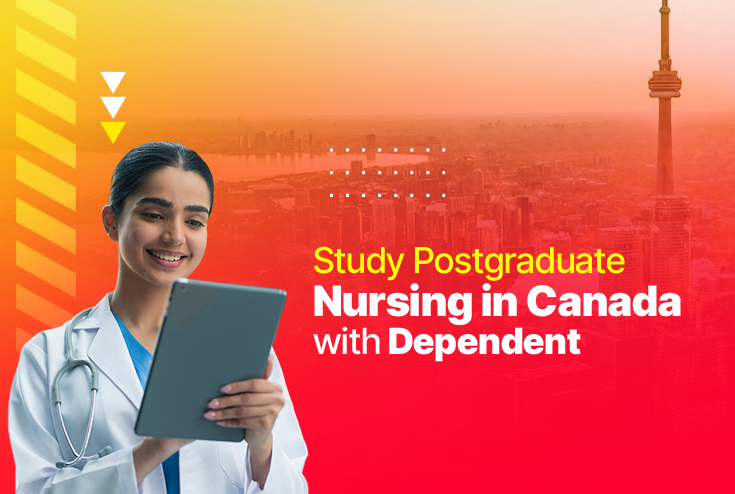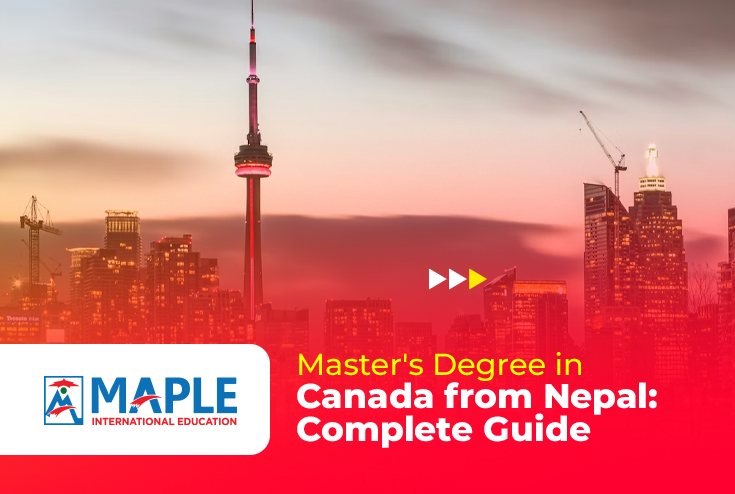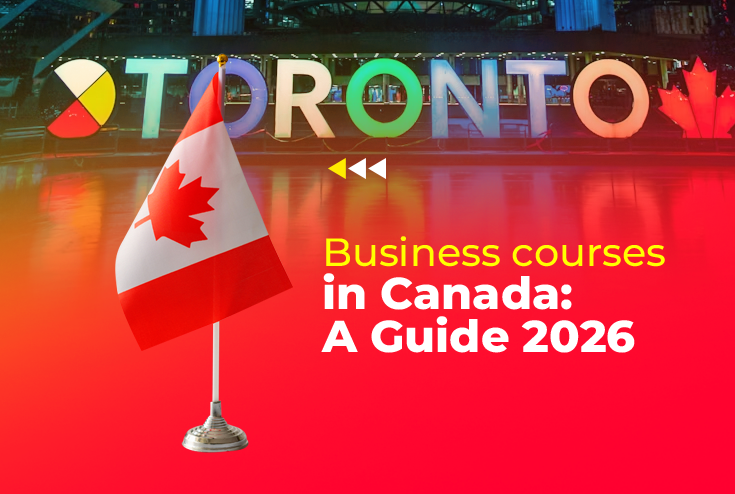
Postgraduate Nursing Diploma in Canada: Dependent, PR & Work Permit
Canada is becoming one of the most trusted destinations for Nepalese nurses seeking career advancement, international licensure, and long-term settlement. The country offers specialized postgraduate diplomas and structured academic pathways for internationally educated nurses (IENs). especially those with backgrounds in Bachelor-level nursing from Nepal.
This guide is designed to help you understand how to study postgraduate nursing in Canada, how to apply with your spouse or child, what kind of nursing programs best suit your qualifications, and how to prepare for licensure exams like the NCLEX-RN or CPNRE.
Table of Contents
Why Study Nursing in Canada After Graduation from Nepal?
What is a Postgraduate Nursing Diploma in Canada?
What is Postgraduate Diploma in Nursing Practice for?
Who is Eligible for PG Diploma in Canada?
Popular Postgraduate Nursing Programs and Specializations in Canada
Career Outcomes After PG Diploma in Nursing Practice in Canada
Study Postgraduate Nursing in Canada with Dependent: Spouse and Children
Eligibility to Bring Dependents While Studying Nursing in Canada
Benefits of Studying a Postgraduate in Nursing Practice with Dependents
Apply for Dependent Visa: Together or Separately?
Requirements to Study Postgraduate Diploma in Nursing in Canada
Academic & Professional Documents (for Admission)
Language Proficiency Documents
Immigration & Visa Documents (for Study Permit Application)
Additional Requirements to Apply for Nursing Studies with Dependent
Financial Proofs (for Study Permit Application)
Cost to Study Postgraduate Nursing Practice in Canada
1. Tuition Fees for PG Diploma in Nursing Studies
2. Living Expenses in Canada for International Students
3. Additional Expenses for Studying Postgraduate Degree in Canada from Nepal
Licensure Pathway After PG Diploma
Permanent Residency (PR) After a Postgraduate Nursing Diploma in Canada
How Maple International Helps Nepalese Nurses Study in Canada
Conclusion: Your Next Nursing Chapter Begins Here
Frequently Asked Questions (FAQs)
Why Study PG Nursing in Canada After Graduation from Nepal?
For Nepalese nurses, pursuing nursing education in Canada is more than earning a foreign qualification — it’s about expanding your scope, gaining global recognition, and securing a future where your skills are valued.
1. Global Demand for Nurses
Canada’s healthcare system is in urgent need of skilled professionals, and internationally educated nurses are a key part of the solution. For Nepalese nurses, this demand creates an opportunity to step into a well-respected profession abroad, where your experience and training can be refined to meet global standards.
2. Work and Immigration Opportunities
Most nursing programs lead to a Post-Graduation Work Permit (PGWP), which allows you to work legally in Canada and build points toward Permanent Residency (PR). Canada offers a more structured pathway where skilled nurses can grow their careers and plan for long-term settlement with their families.
3. Family Inclusion Options (Dependents)
If you are married or have children, many nursing colleges in Canada allow you to apply with your dependents. Your spouse can work full-time, and your children can attend public schools for free. For many Nepalese families, this is a chance to study, work, and stay together while building a future abroad.
4. Support for Licensure and Career Pathway
Canada offers programs that directly prepare Nepalese nurses for licensing exams like NCLEX-RN or CPNRE, which are required to become a Registered Nurse (RN) or Licensed Practical Nurse (LPN). These structured programs make it easier to bridge your Nepal-based education into the Canadian healthcare system.
5. Dignity, Pay, and Professional Growth
Nurses in Canada enjoy high social respect, career security, and competitive salaries. The Canadian system rewards nurses with access to continuing education, specialization, and the chance to grow into leadership roles.
6. Favourable Curriculum
These programs often focus on Canadian nursing practices, legal and ethical frameworks, communication in a Canadian context, and cultural safety.
7. Clinical Experience
Many programs include practical placements (clinical hours) in Canadian healthcare settings, which are invaluable for gaining hands-on experience and understanding the system.
8. Pathway to Permanent Residency
Gaining Canadian work experience as a nurse after your studies can significantly improve your eligibility for various permanent residency pathways, such as Express Entry (Federal Skilled Worker Program, Canadian Experience Class) or Provincial Nominee Programs (PNPs)
What is a Postgraduate Nursing Diploma in Canada?
A Postgraduate Diploma in Nursing Practice is a program designed for internationally educated nurses (IENs) (RN graduates from Nepal), who want to upgrade their qualifications, meet Canadian nursing standards, and work toward licensure.
This program bridges the gap between your current education and what’s required to practice nursing in Canada. It focuses on Canadian healthcare systems, communication skills, patient safety, and clinical placements, all while preparing you for licensure exams like the NCLEX-RN or CPNRE.
Postgraduate diplomas sit academically above a bachelor’s degree but below a master’s, making it a perfect fit for Nepalese nurses looking to enter the profession in Canada without having to go through a master’s track right away.
Most PG Diploma in Nrursing programs take 2 years to complete in Canada, and are offered by Designated Learning Institutions (DLIs), meaning they qualify for Post-Graduation Work Permits (PGWP).
Features of Postgraduate Diploma in Nursing Courses in Canada
What is Postgraduate Diploma in Nursing Practice for?
This path is especially relevant for Nepalese nurses who want a realistic and structured way to transition into Canadian nursing, while still being able to bring their spouse and children, gain experience, and work toward PR.
Ideal for:
- BN or BSN graduates without a Canadian RN license
Nurses looking to meet NNAS recommendations
Nurses planning to bring dependents and settle long-term in Canada
Who is Eligible for PG Diploma in Canada?
The eligibility requirements for post-graduate diploma nursing courses in Canada are as follows:
A Bachelor's in Nursing
A valid Nepal Nursing Council license
2 years of nursing experience (preferred)
IELTS score of 6.0 to 6.5 overall (no band less than 6)
PTE 60 (no band less than 60)
A clean academic record and no recent backlogs
These programs are often designed to help you bridge into the Canadian nursing system, making them a strong choice for licensure and settlement goals.
The postgraduate diploma option is more accessible for Nepalese nurses who may not meet the strict academic or language benchmarks of a master’s degree.
Popular Postgraduate Nursing Programs and Specializations in Canada
Canada offers a wide range of postgraduate nursing programs tailored to internationally educated nurses (IENs), including those from Nepal. Whether your goal is to prepare for licensure or advance into a leadership role, there’s a program that fits.
Popular Colleges and Programs:
These diplomas often include clinical practicums and co-op components that offer real-world Canadian healthcare experience — a strong advantage for licensure and job readiness, especially for Bachelors in Nursing graduates and RNs.
Common Nursing Courses and Specialised Learning Areas:
Canadian healthcare system
Professional communication and ethics
Health assessment and clinical judgment
Pharmacology and chronic care
Clinical placements and simulation labs
NCLEX-RN or CPNRE preparation
These programs not only help you qualify for nursing licensure but also provide practical experience that boosts your job prospects immediately after graduation.
Career Outcomes After PG Diploma in Nursing Practice in Canada
Primary Career Outcome: Licensure as a Nurse in Canada
NCLEX-RN: This is the national licensure examination for Registered Nurses. Passing this is essential to become an RN.
CPNRE (Canadian Practical Nurse Registration Examination): If your education and assessment align more closely with Practical Nursing, you might pursue LPN licensure and take the CPNRE.
Job Roles Once Licensed
Canada has a high and consistent demand for nurses across various sectors. Once licensed, you can find fulfilling roles in:
Hospitals: These are major employers for nurses, offering a wide array of specialties:
Medical-Surgical Nurse
Emergency Room (ER) Nurse
Intensive Care Unit (ICU) Nurse
Pediatric Nurse (children's health)
Maternity/Labor and Delivery Nurse
Oncology Nurse (cancer care)
Perioperative Nurse (Operating Room/PACU)
Cardiac Nurse
Neurology Nurse
Mental Health Nurse (in-patient psychiatry)
Community Health: Focuses on health promotion and disease prevention outside of acute care settings:
Public Health Nurse (immunization, health education, disease surveillance)
Home Care Nurse (providing care in patients' homes)
School Nurse (student health and wellness)
Clinic Nurse (in family practices or specialized clinics)
Occupational Health Nurse (workplace health and safety)
Long-Term Care Facilities: Providing ongoing care for elderly residents or individuals with chronic conditions:
Geriatric Nurse
Palliative Care Nurse
Rehabilitation Nurse
Specialized and Advanced Roles: With further experience, education (like a Master's degree), or certifications, nurses can advance into:
Clinical Nurse Specialist (expert in a specific clinical area)
Nurse Educator (teaching in academic or healthcare settings)
Nursing Manager/Leader (supervising nursing teams, unit management)
Nurse Practitioner (NP - an advanced role with diagnostic and prescribing authority)
Research Nurse
Infection Control Nurse
Why this matters: A PG Diploma not only facilitates your licensure but also provides the Canadian-specific knowledge and clinical experience crucial for succeeding in these diverse and in-demand roles, ultimately opening pathways to permanent residency.
Study Postgraduate Nursing in Canada with Dependent: Spouse and Children
One of the biggest advantages of choosing Canada for your postgraduate nursing studies is the opportunity to bring your dependent spouse and children. Canada supports international students through structured visa pathways that allow you to live, study, and build a future with your family by your side.
Eligibility to Bring Dependents While Studying Nursing in Canada
You can apply for visas for your spouse and children under your student permit, and take them with you to Canada as long as you are:
Enrolled in a full-time program that is PGWP-eligible
Your chosen PG Nursing program is offered by a Designated Learning Institution (DLI) in Canada
Benefits of Studying a Postgraduate in Nursing Practice with Dependents
Canada offers several benefits for your spouse and children while you study nursing:
1. Spouse Open Work Permit (SOWP)
Your husband or wife can apply for an open work permit, which allows them to:
Live with you throughout your study period
Work full-time for any employer, without needing a job offer
Gain Canadian work experience to support your family’s PR plans
For many Nepalese couples, this allows both partners to contribute financially and plan for long-term settlement in Canada.
2. Children’s Education and Living Benefits
If you bring your child to Canada:
They can attend public primary or secondary schools for free in most provinces
They will have access to healthcare, child benefits, and social services (depending on visa type and province)
Your family will enjoy a safe, multicultural environment with an excellent quality of life
Apply for Dependent Visa: Together or Separately?
There are two common approaches to apply for your dependents as an international student:
Apply together with your initial student permit
Apply alone first, and invite your spouse and children later, after settling in Canada
Both are valid; your choice depends on your financial readiness, accommodation availability, and visa strategy.
For dependent visa application, you need to fulfil some additional financial and documentation requirements. You can discover them all in the respective sections below.
Requirements to Study Postgraduate Diploma in Nursing in Canada
Here's a breakdown of the document requirements for studying a Postgraduate Diploma in Nursing Practice in Canada from Nepal, presented in tables with concise descriptions.
I. Academic & Professional Documents (for Admission)
These documents are primarily for your application to a Canadian educational institution.
Note: Some universities may have their distinct admission requirements. Always check your chosen college/university’s website before applying.
II. Language Proficiency Documents
This proves your English language ability to study in Canada through recognised test scores.
Note: Make sure your test scores are valid (recent; no older than 2 years, and issued by a recognised body,).
III. Immigration & Visa Documents (for Study Permit Application)
These are for your application to Immigration, Refugees and Citizenship Canada (IRCC) for a study permit.
Valid Passport
Letter of Acceptance (LOA)
Provincial Attestation Letter (PAL)
Passport-sized Photos
Immigration Medical Exam (IME)
Police Clearance Certificate
Biometrics Confirmation
Tuition Fee Receipt
No Objection Certificate (NOC)
Additional Requirements to Apply for Nursing Studies with Dependent
Valid passports for all family members
Marriage certificate (for spouse) and birth certificate(s) (for children)
Translated and notarised documents, if needed
Financial proof and sponsorship letter (if applicable)
Letter of Acceptance (LOA) from a DLI (of the student)
Visa forms, biometrics, and medical exams as required
Need Expert Help?
Maple International Education supports Nepalese nurses at every step, from shortlisting programs to visa assistance and dependent inclusion. They’ve successfully guided students to Langara, Stenberg, Conestoga, and more.
IV. Financial Proofs (for Study Permit Application)
These demonstrate you have sufficient funds to cover your education and living expenses in Canada. While as a student, you would need to show only CAD 20,635, you will need additional funds for your respective dependents.
Required Financial Proof
To apply with dependents, you’ll need to show proof that you can financially support your family in Canada.
You can show this through bank statements, fixed deposits, income sources, or sponsorship letters. A strong financial profile can improve visa approval chances, especially when applying together.
Health Insurance for Your Dependents
Your spouse and children must be covered by health insurance while in Canada.
Some provinces include dependents in the public healthcare plan
In others, you may need to purchase private health insurance until permanent coverage becomes available
Did You Know?
Many Nepalese students studying nursing in Canada bring their family, complete their program, and transition to Permanent Residency together, with Canadian work experience and qualifications boosting their Express Entry or PNP score.
Cost to Study Postgraduate Nursing Practice in Canada
You can expect the total cost of CAD 47,000 - 100,000 to study postgraduate nursing practice in Canada from Nepal, including tuition fees, visa application, financial requirements, as well as flight tickets. This total can vary by your chosen program, its duration, and your location.
Moreover, scholarships can significantly lower this cost, while part-time jobs can help you cover the living expenses.
1. Tuition Fees for PG Diploma in Nursing Studies
Generally, the tuition for a Postgraduate Diploma in Nursing Practice ranges from CAD 18,000 to CAD 25,000. For a one-year program, this would be your total tuition cost. For a two-year program, you'd multiply this by two.
However, the specific fee can vary widely depending on the institution (university or college), its location, and the specific program's duration (typically 2 years).
Note: Always check the exact tuition fees on the official website of your chosen college or university, as these figures are averages.
2. Living Expenses in Canada for International Students
Your location in Canada significantly affects your cost of living. On average:
Living in cities like Toronto or Vancouver is more expensive than places like Winnipeg, Halifax, or Regina.
Extra Living Costs for Spouse and Children
If you plan to study with a dependent:
3. Additional Expenses for Studying Postgraduate Degree in Canada from Nepal
Ways to Manage Expenses
Choose public colleges offering PGWP-eligible diplomas
Look for co-op or internship programs to earn while studying
Apply for entrance or in-course scholarships
Consider provinces with lower cost of living like Manitoba, Saskatchewan, or New Brunswick
Working part-time during your studies (up to 24 hours/week, as of June 2025) and full-time during scheduled breaks
Book flights 3-6 months in advance
Lower Your Total Price of Studying in Canada with Maple International Education!
We are a professional team of student recruiters with over a decade of experience. Contact us for affordable education in Canada with scholarships, and strategies for minimal expenses and maximum result. Book A Free Visit Now!
Licensure Pathway After PG Diploma
Step 1: NNAS Evaluation
Before starting your program (or sometimes during), apply to the National Nursing Assessment Service (NNAS). They compare your Nepalese nursing education to Canadian benchmarks.
You’ll need:
BN academic transcripts
Nepal Nursing Council license
Employment verification
IELTS/TOEFL scores
Identity documents
You’ll get an Advisory Report — most Nepalese nurses are asked to complete additional education (this is where the PG Diploma comes in).
Step 2: Complete Your Bridging Program in Canada
Choose a PGWP-eligible diploma program that:
Cover Canadian nursing laws, ethics, and practice
Include clinical placements or co-op work
Prepare you for NCLEX-RN (or CPNRE if LPN)
Step 3: Apply to a Provincial Nursing Regulatory Body
After completing your diploma, you can apply to the nursing regulator in your province (e.g., BCCNM in BC, CNO in Ontario).
They’ll review your:
NNAS report
Completion of bridging program (postgraduate diploma in this case)
English language scores
Recent work/clinical experience
Step 4: Pass the Licensing Exam
For RN: Pass the NCLEX-RN
For LPN: Pass the CPNRE
Once you pass, you can register and start working as a licensed nurse in Canada.
Permanent Residency (PR) After a Postgraduate Nursing Diploma in Canada
Finishing your postgraduate nursing diploma in Canada is more than just an academic milestone — it’s a strategic step toward Permanent Residency (PR). With Canada's growing need for skilled healthcare workers, internationally educated nurses (IENs) — especially from countries like Nepal — have a strong pathway to stay and work in Canada permanently.
Here’s how you can work toward PR after completing your studies:
Step 1: Complete a PGWP-Eligible Program at a DLI
Your postgraduate diploma must be:
Full-time
At least 8 months in duration (most nursing diplomas are 1–2 years)
Offered by a Designated Learning Institution (DLI)
This makes you eligible for a Post-Graduation Work Permit (PGWP) of up to 3 years, depending on program length.
Step 2: Work in Canada Under PGWP
Once you receive your PGWP, you can:
Work full-time in any nursing-related role, including hospitals, aged care, and clinics
Gain 1 year of Canadian work experience in a skilled job (NOC 31301 for RNs, NOC 32101 for LPNs)
This experience is essential for PR pathways like Express Entry and Provincial Nominee Programs (PNPs)
Step 3: Apply for Canadian Permanent Residency
There are several PR options for internationally educated nurses:
1. Express Entry (Federal Skilled Worker or Canadian Experience Class)
Create an Express Entry profile
Gain Comprehensive Ranking System (CRS) points for education, Canadian work experience, language proficiency, and age
Get invited to apply for PR during periodic draws
Canadian education + skilled work experience gives you a strong CRS boost
2. Provincial Nominee Programs (PNPs)
Many provinces offer direct or Express Entry-linked nomination streams for healthcare professionals.
Some streams prioritize applicants who studied and worked in the same province, which makes your PG diploma even more valuable.
3. Rural and Healthcare-Focused Pathways
Programs like the Atlantic Immigration Program (AIP) and Rural and Northern Immigration Pilot (RNIP) actively invite healthcare professionals to settle in under-served communities
Completing a co-op or work placement in these areas during your diploma can strengthen your eligibility
Step 4: Apply with Your Family
Once eligible, you can include your spouse and children in your PR application.
If your spouse worked in Canada during your study period, that adds value to the application
Your children also gain access to free public education and healthcare as PR holders
Did You Know?
Most Nepalese nurses who complete their postgraduate diploma, secure a full-time nursing job, and apply through Express Entry or a PNP receive their PR within 6 to 18 months after graduating.
How Maple International Helps Nepalese Nurses Study in Canada
At Maple International Education, we understand that applying for nursing studies abroad isn't just about academics — it's about your future, your family, and your professional identity.
That’s why we offer:
Course selection support - the right Postgraduate program for your academic, professional, and financial program
IELTS and application guidance - Complete language classes and step-by-step guidance from documentation to SOP
Dependent visa support so you don’t have to leave your family behind
Licensure roadmap - From NNAS to NCLEX, we walk you through the process
Post-study and PR planning - so you move forward with clarity and confidence
If you're a Nepalese RN nurse ready to step into the next phase of your nursing career, Canada has a path for you — and we’re here to help you find it.
Conclusion: Your Next Nursing Chapter Begins Here
Studying postgraduate nursing in Canada opens more than academic doors — it offers a chance to practice globally, earn professionally, and build a life with stability and growth. Your journey begins with the right preparation, annd the right support.
Let Maple International be that support — we’ve helped hundreds of Nepalese nurses take this step, and we’d be honoured to help you too.
Visit us at our nearest branch, or message us to get started today.
Frequently Asked Questions (FAQs) - Postgraduate Diploma in Nursing Practice in Canada
What are the best postgraduate nursing programs in Canada for Nepalese nurses?
Postgraduate diplomas like Langara’s Post-Degree Diploma in Nursing Practice and Stenberg’s Canadian Nursing with Co-op are top choices for Nepalese RN nurses aiming to meet Canadian licensure standards.
Can PCL nurses from Nepal study nursing in Canada?
No. Postgraduate diploma programs are designed for internationally educated nurses who have completed Bachelors Degree in Nursing. These programs help bridge the gap for licensure and employment in Canada.
What is the IELTS requirement for nursing programs in Canada?
Most postgraduate diploma programs require an IELTS score of 6.0–6.5 overall, while master’s programs often require 7.0+ with no band below 6.5.
Is NCLEX required to become a nurse in Canada?
Yes. To become a Registered Nurse (RN), you must pass the NCLEX-RN. For Licensed Practical Nurse (LPN) roles, the CPNRE is required. Most postgraduate diplomas help you prepare for these exams.
What’s the difference between a postgraduate diploma and a master’s in nursing in Canada?
A postgraduate diploma prepares you for clinical licensure and is ideal for Nepalese nurses with BN degrees. A master’s in nursing is academic and specialization-focused, suitable for BSN holders aiming for leadership or education roles.
Can I study nursing in Canada with my husband or child?
Yes. Canada allows international students to bring dependents. Your spouse can work full-time, and your child can attend public school for free, if you're enrolled in a PGWP-eligible full-time nursing program.
How much does it cost to study a postgraduate diploma in nursing in Canada from Nepal?
Tuition costs range between CAD 15,000–30,000 per year, depending on program type. Living expenses average CAD 1,500–2,500 per month, especially if you bring dependents.
Which Canadian provinces are affordable for Nepalese nursing students?
Cities like Winnipeg, Regina, Halifax, and Thunder Bay offer lower tuition, cheaper rent, and fewer living expenses compared to places like Toronto or Vancouver.
Can I apply for PR after studying nursing in Canada?
Yes. Most nursing roles fall under Canada’s skilled occupation list. After graduating and gaining work experience, you can apply for Permanent Residency (PR) through Express Entry or Provincial Nominee Programs.
Who can help me apply from Nepal?
Maple International Education is a trusted consultancy in Nepal with years of experience helping nurses apply to Canadian nursing programs, secure dependent visas, and prepare for PR opportunities.
Can I get PR after 1 year PG Diploma in Canada?
Getting PR after a 1-year PG Diploma is challenging but possible, primarily through the Canadian Experience Class (CEC) or Provincial Nominee Programs (PNPs). The main hurdle is that a 1-year PGWP only gives you a tight window to gain the required 12 months of skilled Canadian work experience for CEC, making immediate employment and strategic PNP alignment crucial.
Also Read
Nursing in Canada for International Students
Best Consultancy in Nepal for Canada
Master's by Research in Canada for Nepalese Students




